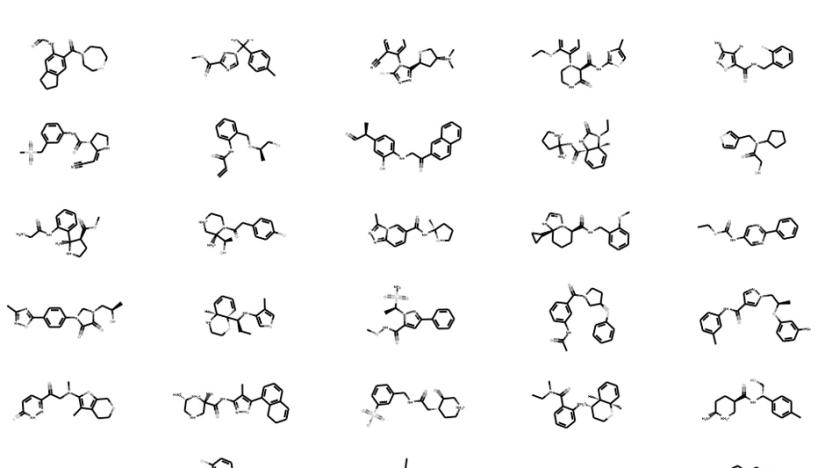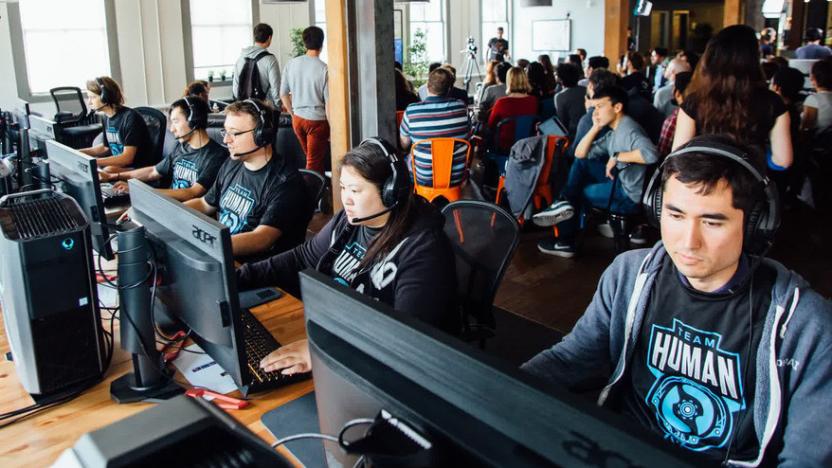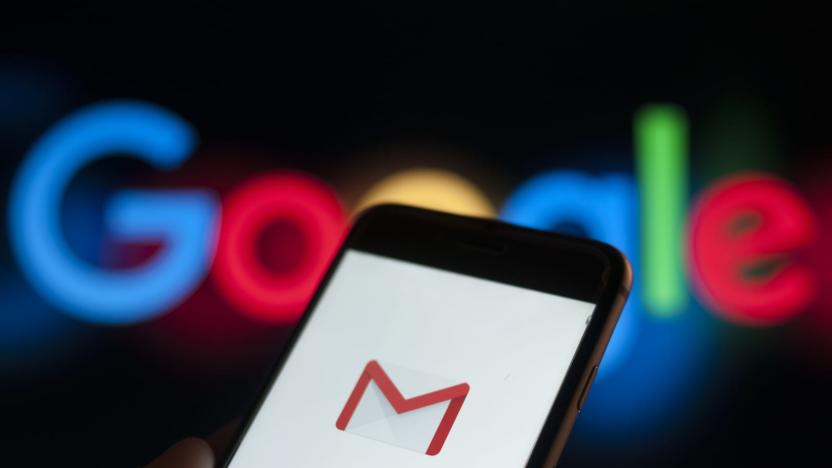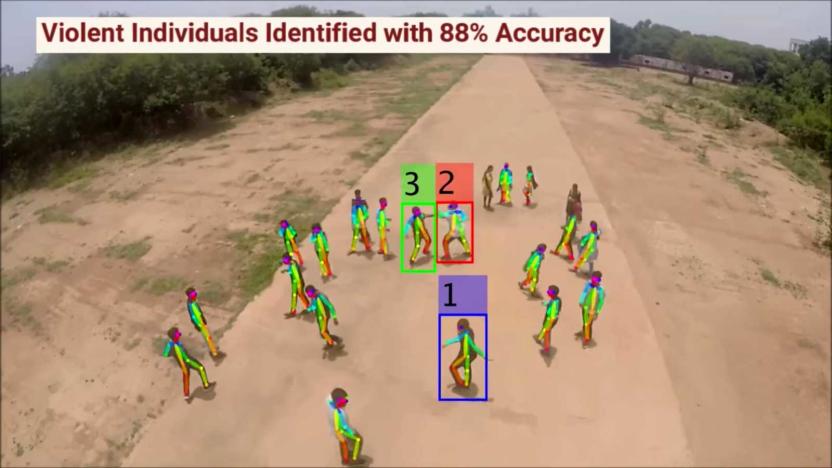MachineLearning
Latest

'Robot chemist' could use AI to speed up medical breakthroughs
Scientists can only do so much to discover new chemical reactions on their own. Short of happy accidents, it can take years to find new drugs that might save lives. They might have a better way at the University of Glasgow, though: let robots do the hard work. A research team at the school has developed a "robot chemist" (below) that uses machine learning to accelerate discoveries of chemical reactions and molecules. The bot uses machine learning to predict the outcomes of chemical reactions based on what it gleans from direct experience with just a fraction of those interactions. In a test with 1,000 possible reactions from 18 chemicals, the machine only needed to explore 100 of them to predict study-worthy reactions in the entire lot with about 80 percent accuracy.

DARPA wants better forecasts for near-Earth orbit space missions
DARPA, the government's mad science wing, wants "weather" forecasts for outer space like we've got here on terra firma. The idea is that as we're increasingly launching satellites into low-Earth orbit -- not to mention prepping for commercial spaceflight -- we'll need the ability to predict smaller space weather events as well as big ones.

Samsung's new DRAM chip will make phones run faster and longer
Samsung has been busy improving its microSD range, introducing SSDs with faster write speeds, and opening the world's biggest mobile factory, but the electronics maker doesn't appear to be slowing down any time soon -- it's just completed tests on a 8Gb LPDDR5 DRAM prototype, a faster, low power RAM that will be used to power machine learning applications and AI in 5G phones.

Hinge uses AI to suggest a 'most compatible' date every day
Now that dating giant Match owns Hinge, what's its first move? It's using a dash of AI to help you find a partner sooner. Hinge is trotting out a Most Compatible feature that uses machine learning and the Gale-Shapley algorithm (aka the "stable marriage" algorithm) to send daily recommendations for people who it thinks would be just as interested in you as you are with them. It's effectively a virtual matchmaker -- you might not have to spend ages swiping right on people who never swipe back, or participating in conversations that go nowhere.

Facebook improves AI by sending 'tourist bots' to a virtual NYC
As a general rule, AI isn't great at using new info to make better sense of existing info. Facebook thinks it has a clever (if unusual) way to explore solutions to this problem: send AI on a virtual vacation. It recently conducted an experiment that had a "tourist" bot with 360-degee photos try to find its way around New York City's Hell's Kitchen area with the help of a "guide" bot using 2D maps. The digital tourist had to describe where it was based on what it could see, giving the guide a point of reference it can use to offer directions.

Former Google AI chief will lead Apple’s new machine learning team
Back in April, Google's former AI and search chief John Giannandrea left the company to join Apple for an undisclosed role. Today, the latter company announced he will head a new team combining the Core ML and Siri groups.

MIT researchers automate drug design with machine learning
Developing and improving medications is typically a long and very involved process. Chemists build and tweak molecules, sometimes aiming to create a new treatment for a specific disease or symptom, other times working to improve a drug that already exists. But it takes a lot of time and a lot of expert knowledge, and attempts often end with a drug that doesn't work as hoped. But researchers at MIT are using machine learning to automate this process. "The motivation behind this was to replace the inefficient human modification process of designing molecules with automated iteration and assure the validity of the molecules we generate," Wengong Jin, a PhD student in MIT's Computer Science and Artificial Intelligence Laboratory, said in a statement.

Xbox One's fast-loading feature rolls out today
Xbox's July update is rolling out to consoles today, and it introduces an exciting feature: FastStart. It's designed to prioritize the files necessary to start playing a game and download those first. That way, you can cut down the time between downloading a game and firing it up.

OpenAI's 'Dota 2' bots are taking on pro teams
The Dota 2 world championship, The International, is fast approaching, and a top team will have a different-looking squad to contend with: a group of artificial intelligence bots. OpenAI, which Elon Musk co-founded, has been taking on top Dota 2 players with the bots since last year, and now it's gunning for a team of top professionals in an exhibition match at one of the biggest events in eSports.

Speedy AI image analysis could help doctors during surgery
Right now, comparing 3D medical scans is a pain -- it can take two hours or more to see what's changed. And that spells trouble for surgeons, who may have to bring patients back to the operating room if a tumor removal wasn't a complete success. Thankfully, AI technology may eliminate that hassle. An MIT-led research team has crafted a machine learning algorithm that can analyze 3D scans up to 1,000 times faster than before, making it possible to study changes almost in real time -- less than a second on a PC with a fast graphics card.

Xbox One preview brings FastStart loading to Game Pass
If you like the thought of speeding up access to Xbox Game Pass titles with FastStart, you don't have to wait until the finished Xbox One update arrives later in June -- you can try it right now. Microsoft has rolled out FastStart to both its Xbox One Preview Beta members as well as some Delta Ring users. As the company outlined at E3, it uses machine learning to make titles playable roughly twice as quickly as before by downloading just those elements you actually need to get started.

Gmail for iOS is using AI to prioritize your notifications
Mobile email notifications are a nightmare. You always have new email. So as part of its big Gmail redesign, Google is aiming to make alerts for its mobile apps more useful. Starting with the Gmail iOS app (and soon for Android), the company is rolling out notifications for high priority messages. It's powered by AI and machine learning to determine relevant emails. The feature first appeared in Google's Inbox app, something that's serving as a testbed for new capabilities before they roll out to the much larger Gmail audience.

Goldman Sachs’ AI predicts Brazil will win the World Cup
Goldman Sachs is giving another go at predicting which team will win this year's World Cup. After incorrectly predicting how the 2014 tournament would turn out, it's trying again and its calculations say that France, Brazil, Portugal and Germany will make it to the semi-finals with Brazil beating out Germany in the final game.

Xbox Game Pass 'FastStart' is coming in the June update
During Microsoft's pre-E3 event, Xbox Game Pass exec Ashley Speicher hit the stage to announce several games newly available on the service today (Fallout 4, Elder Scrolls Online and The Division), plus a new feature. Called "FastStart" it's designed to get subscribers with playing their games even faster, by applying machine learning to download just the necessary parts of a game first, unlike the Ready to Start system configured manually by developers that has been a part of the system since it launched. Speicher said it would get games going twice as fast as before (if launching a title used to take 30 minutes of downloading, you can expect it to take only 15 minutes now), and will launch in the June Xbox One update for application to "select" titles (there will be a list available on the FAQ here). Better yet, while it will start off on Xbox Game Pass titles in English, it will eventually expand to games in more languages, and other games on Xbox even if you're not using Game Pass.

Scientists created a psychopathic AI using Reddit images
There's no shortage of films and TV shows that speculate on the dark side of artificial intelligence -- 'robot goes wrong and chaos ensues' is a pretty popular Hollywood trope. Now, in a study that sounds like the plot of a movie itself, researchers have actively encouraged an AI algorithm to embrace evil by training it to become a psychopath. A psychopath called Norman.

Experimental drone uses AI to spot violence in crowds
Drone-based surveillance still makes many people uncomfortable, but that isn't stopping research into more effective airborne watchdogs. Scientists have developed an experimental drone system that uses AI to detect violent actions in crowds. The team trained their machine learning algorithm to recognize a handful of typical violent motions (punching, kicking, shooting and stabbing) and flag them when they appear in a drone's camera view. The technology could theoretically detect a brawl that on-the-ground officers might miss, or pinpoint the source of a gunshot.

Google reportedly won’t renew its controversial military AI contract
The controversial government contract that led thousands of Google employees to sign a petition in opposition and dozens to quit in protest will not be renewed, Gizmodo reports. Project Maven has been billed by Google as a small, "non-offensive" deal through which it would provide open-source AI software to the Pentagon that could help the military flag drone images requiring further human review. But the project has been decried by many of the company's employees who believe it could hurt efforts to hold the public's trust and went against Google's "Don't Be Evil" motto.

Samsung opens second North American AI lab in Toronto
If it wasn't already apparent that Canada is becoming a major hub for AI research, it is now. Samsung has opened an AI Center (or Centre, for the Canadian crowd) in Toronto, and it's only the company's second big lab in North America -- the other is located near Google in Mountain View. The new location will help foster AI across a wide range of devices, ranging from self-driving cars to smart appliances.

FDA approves AI tool for spotting wrist fractures
The FDA has been approving its fair share of AI-powered medical technology, but its latest might be particularly helpful if you ever have a nasty fall. The agency has greenlit Imagen's OsteoDetect, an AI-based diagnostic tool that can quickly detect distal radius wrist fractures. Its machine learning algorithm studies 2D X-rays for the telltale signs of fractures and marks them for closer study. It's not a replacement for doctors or clinicians, the FDA stressed -- rather, it's to improve their detection and get the right treatment that much sooner.

IBM built a handheld counterfeit goods detector
Just a month after IBM announced it's leveraging the blockchain to guarantee the provenance of diamonds, the company has revealed new AI-based technology that aims to tackle the issue of counterfeiting -- a problem that costs $1.2 trillion globally. IBM Crypto Anchor Verifier brings together AI and optical imaging to help prove the identity and authenticity of frequently forged goods such as fine wine, diamonds and medicine, as well as analyze water quality and detect bacteria, such as E.coli. And the technology is small enough to use with a cell phone camera.









